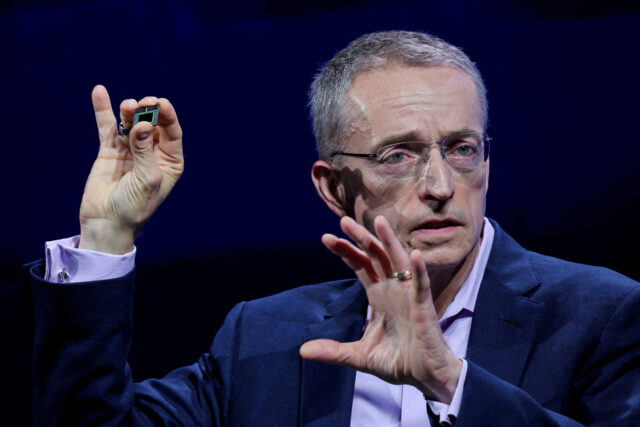
Intel Chief Executive Pat Gelsinger has stepped down less than four years after taking the helm of the company.
The 63 year-old American business executive and engineer returned to Intel as CEO in February, 2021.
He has handed control to two lieutenants as the faltering American chipmaking icon searches for a permanent replacement.
The company named Chief Financial Officer David Zinsner and senior executive Michelle Johnston Holthaus as interim co-chief executive officers.
Holthaus and Zinsner pledged to continue Gelsinger’s work and said that they would redouble their commitment to Intel Products and meeting customer needs.
Intel announced on Monday that Patrick Paul Gelsinger was stepping down from both his executive role and the company’s board of directors after a career of over forty years.
Gelsinger left after a board meeting last week.
During this meeting, directors felt Gelsinger’s costly and ambitious plan to turn Intel around was not working, according to a person familiar with the matter.
The company’s board has constituted a search committee to appoint Gelsinger’s successor.
Gelsinger, who resigned on December 1, left the company before the completion of an ambitious and costly four-year plan to restore the company’s lead in making the fastest and smallest computer chips.
This is a crown Intel lost to Taiwan Semiconductor Manufacturing Co, which makes chips for Intel rivals such as Nvidia.
“Leading Intel has been the honour of my lifetime,” Gelsinger said in a statement.
He further said,”Today is, of course, bittersweet as this company has been my life for the bulk of my working career.”
Gelsinger added, “I can look back with pride at all that we have accomplished together.”
While Gelsinger has assured both investors and U.S. officials, who are subsidizing Intel’s turnaround, that his manufacturing plans remain on track, the full results will not be known until next year.
The company aims to bring a flagship laptop chip back into its own factories in the coming year.
“While we have made significant progress in regaining manufacturing competitiveness and building the capabilities to be a world-class foundry, we know that we have much more work to do at the company and are committed to restoring investor confidence,” Frank Yeary, independent chair of the board, said.
Shares of the company rose nearly five per cent in pre market trading.
The stock has lost more than half of its value this year, and was replaced last month by Nvidia on the blue-chip Dow Jones Industrial Average index.
(With inputs from Reuters)
Delhi based journalist pickled in journalism. Have reported from nine world capitals and almost all parts of India. Over the last three decades, I have worked for India’s mainstream English dailies and contributed to All India Radio, Doordarshan and Women’s Feature Service. Also worked for international media including Japan’s leading newspaper, The Asahi Shimbun and done assignments for The Sunday Times, London, The Telegraph, The Guardian and the Canadian Broadcasting Corporation. Worked in the Embassy of France in New Delhi and can speak French to save my life. Write on Diplomacy, Politics and the social sector. Love Nature, heritage, Nature, animals and vintage cars. Enjoy cycling and playing badminton.




